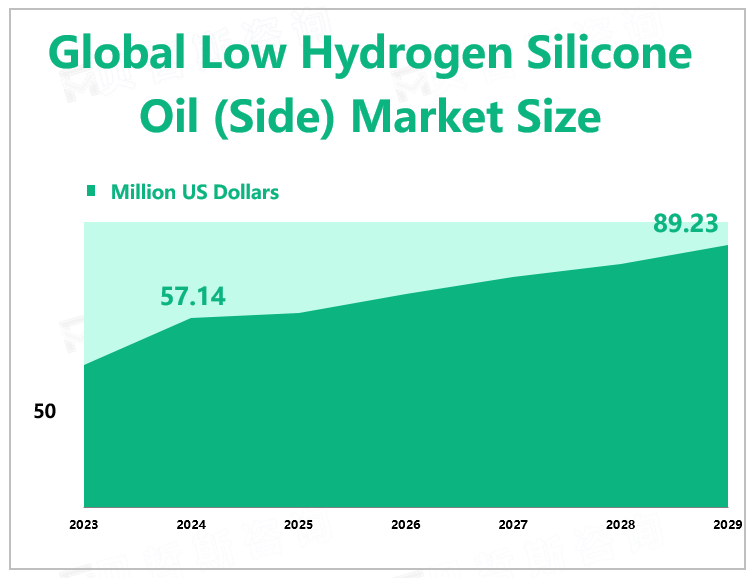Global Low Hydrogen Silicone Oil (Side) Market Overview
According to Global Market Monitor, the global low hydrogen silicone oil (side) market size is $57.14 million in 2024 and is expected to grow to $89.23 million by 2029.
Low hydrogen-containing silicone oil, which is defined as a relatively high hydrogen-containing silicone oil (having a hydrogen value of 1.6), contains a relatively low activity silicon-hydrogen bond and is synthetic modified silicone oil, such as polyether modified silicone oil, alkyl modified. The basic raw material of silicone oil is also the cross-linking agent for the addition of silicone rubber, and can also be used for the hydrophobic treatment of materials.Low-hydrogen silicone oil products are colorless viscous transparent liquid, non-corrosive, flammable, insoluble in water, soluble in organic solvents, storage temperature should be 20 ° C ~ 40 ° C, transport should be transported as non-dangerous goods.
Market Opportunities and Potentials
At present, the method of producing hydrogen-containing silicone oil is mainly a high-hydrogen-containing silicone oil telomerization method. How control the reaction temperature, time, and the ratio of raw materials to the monomer conversion rate and the refractive index of the product is the key to the quality of the product, so it will be prepared in the future. The main improvement direction of low-hydrogen silicone oil is to adopt a new process to control the reaction speed, and attention should be paid to the purity of the hydrogen-containing monomer. And the improvement of catalysts is also very important for the production of low-hydrogen silicone oil. Solid catalysts have high industrial application value but are expensive. The development of new low-cost and efficient catalysts can improve production efficiency and reduce environmental pollution. The continuous development of new improvement methods and catalysts will inevitably promote the low-hydrogen silicone oil industry, and the application fields of low-hydrogen silicone oil products will continue to expand.

Tighter Environmental Policies
Low-hydrogen silicone oil contains highly active Si-H bonds, which can react with double bonds, hydroxyl groups, and other genes under the action of a catalyst. The currently used catalyst is mainly concentrated sulfuric acid, which is low in price but severely corrodes the container and is not conducive to environmental protection. The acid water produced by water washing after the reaction has certain pollution to the environment. With the continuous tightening of environmental protection policies, companies may need to spend more money on filter residues and wastewater treatment, which may increase the burden on enterprises, especially small and medium enterprises. Moreover, environmental policies also have a great impact on downstream industries. In the papermaking, textile, and other industries, many small and medium-sized enterprises face the threat of shutdown due to non-compliance with environmental protection regulations, which will also have a certain adverse impact on the market of low-hydrogen silicone oil.
|
Company Name |
Wynca |
|
Website |
www.Wynca.com |
|
Established Time |
1965 |
|
Plants Distribution |
China |
|
Sales Region |
Worldwide |
|
Business Introduction |
The company's main businesses are crop protection and organic silicon materials. The product sells well in more than 100 countries and regions around the world. It is an organic silicon company with the advantages of the entire industry chain. |
We provide more professional and intelligent market reports to complement your business decisions.